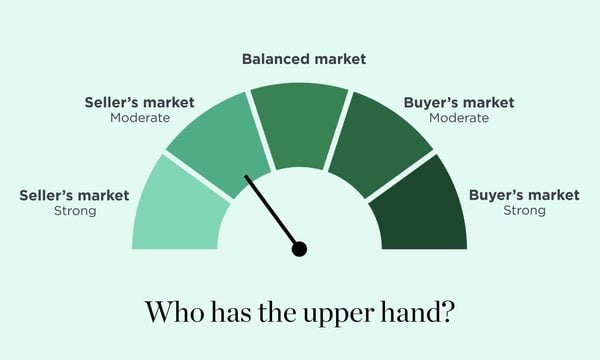Is It a Good Time to Buy a House?
If you’re patient, you could find (or negotiate) a bargain — if you don’t mind moving in the winter.

Some or all of the mortgage lenders featured on our site are advertising partners of NerdWallet, but this does not influence our evaluations, lender star ratings or the order in which lenders are listed on the page. Our opinions are our own. Here is a list of our partners.
The housing market loves to keep us guessing. But the truth is, the right time to buy is when it makes sense for you — not when the headlines say it’s perfect.
Whether you’re actively looking or just thinking a few moves ahead, here’s how to get your game plan in place.
How’s the housing market right now?
Home sales are off to a sluggish start in 2026, thanks in part to January’s extreme cold snap. But mortgage rates are nearly a full percentage point lower than this time last year, helping buyers stretch their dollar.
- What’s coming next: In most places, expect more inventory to come on the market in February. Peak buying season kicks off in April, but it’s possible to score a deal with less competition before the busiest months.
- How to prepare: To lock in today’s comparatively low rates, get a mortgage preapproval on the longer side — say, 45 to 60 days. That’ll lock in your rate through the more active months of March or April, giving you some peace of mind.
Nerdy Perspective
Is now a good time to buy a house?
Yes, February is an ideal time to take your house hunt from “casual” to “official.” Right now, listing activity is slow, so buyers can take their time to make a decision — a nice perk if you’re just starting your search. But as I said in a recent episode of NerdWallet’s Smart Money podcast, the spring buying season heats up sooner than you think. More inventory usually brings more competition, so there’s no time like the present to jump in.

Lots of different forces affect the housing market. Skip ahead to read about:
Weekly average mortgage rates
Mortgage rates went up a little this week.
The interest rate on a 30-year fixed-rate mortgage averaged 5.87% annual percentage rate (APR) for the week ending Feb. 26, up four basis points from last week, according to rates provided to NerdWallet by Zillow. A basis point is one one-hundredth of 1%.
Average weekly mortgage rates
| Mortgage type | APR |
|---|---|
| 30-year fixed mortgage | 5.87% |
| 15-year fixed mortgage | 5.41% |
| 5-year adjustable | 6.36% |
Averages are for the week ending Feb. 26, 2026, according to rates provided to NerdWallet by Zillow.
🤓 Nerdy Tip
Each mortgage lender sets their own rates and fees. Compare offers from at least three mortgage lenders to get the best deal. Rate shopping can save you thousands of dollars over the life of the loan. To learn more about mortgage rates, check out these resources from NerdWallet:
- 📍 Right now: Mortgage rates today
- 📈 Looking ahead: Mortgage interest rates forecast
- 🤔 Shopping around: How to get the best mortgage rate
How do mortgage rates affect housing costs?
When mortgage rates are high, your home buying budget doesn’t stretch as far. Let’s say you’re prepared to make a 20% down payment on a $350,000 house. Here’s what your monthly payments would look like at different interest rates:
| Interest rate | Monthly principal + interest* |
|---|---|
| 5% | $1,503 |
| 5.25% | $1,546 |
| 5.5% | $1,590 |
| 5.75% | $1,634 |
| 6% | $1,679 |
| 6.25% | $1,724 |
| 6.5% | $1,770 |
| 6.75% | $1,816 |
| 7% | $1,863 |
| 7.25% | $1,910 |
| 7.5% | $1,958 |
*For a 30-year fixed-rate mortgage. Does not include homeowners insurance or property taxes.
Mortgage loans from our partners

on NBKC
NBKC 

Min. credit score
620
Min. down payment
3%

on New American Funding
New American Funding 

Min. credit score
N/A
Min. down payment
0%

on GO Mortgage
GO Mortgage 

Min. credit score
620
Min. down payment
3%
Mortgage loans from our partners

on NBKC
NBKC 

Min. credit score
620
Min. down payment
3%

on New American Funding
New American Funding 

Min. credit score
N/A
Min. down payment
0%

on GO Mortgage
GO Mortgage 

Min. credit score
620
Min. down payment
3%

on Rocket Mortgage
Rocket Mortgage 

Min. credit score
580
Min. down payment
3.5%

on Veterans United
Veterans United 

Min. credit score
620
Min. down payment
0%
Inflation and the economy
Is it a bad time to buy a house? From higher grocery prices to a tough job market, headlines about the economy might make you feel rattled. It’s normal to feel worried about making a long-term financial commitment right now. Here’s how to stay grounded:
- 🤔 Consider pausing: If your finances feel shaky — for example, you’re worried about job security or paying bills — it’s wise to hold off.
- 😌 Stay the course: If your income is steady and your budget says the numbers work, don’t let scary “what if” headlines throw you off track.
Did you know...
The Federal Reserve, the nation’s central bank, indirectly influences interest rates on all loans (including mortgages). On Jan. 28, policymakers kept the federal funds rate the same. We’ll find out the Fed’s next move at its upcoming meeting, March 17-18. Is it a buyer’s or seller’s market?

Right now: Seller’s market (moderate)
After years of sellers having a strong upper hand, the vibe has shifted to give buyers more leverage. Here are the signs of a more balanced market:
- ✅ More houses to choose from.
- ✅ Less competition.
- ✅ Wiggle room on price (including sellers accepting offers below asking).
- ✅ Willingness to negotiate on contract terms.
What’s the difference between a buyer’s market and a seller’s market?
Whether we’re in a buyer’s or seller’s market comes down to supply and demand. Available inventory affects who has the upper hand in negotiations.
- 📈 Buyer’s market = high inventory. Buyers have lots of choices and can take their time. Price cuts are common. Buyers might ask sellers to cover some costs or fees.
- 📉 Seller’s market = low inventory: Buyers have fewer choices. Prices and competition heat up. Expect multiple offers above asking price.
- ⚖️ Balanced market = enough homes to go around: Supply and demand are roughly even. This generally happens when the real estate market has about six months’ worth of available inventory.
Did you know...
When a house is listed for sale, it becomes “inventory.” Inventory is measured as a number of months’ supply at the current sales pace. A six-month supply means it would take six months to sell all listed homes, if no new ones came on the market. Let’s dig into the details using January 2026 data from the National Association of Realtors (NAR).
Inventory: Tapering for the season, but up from last year
Seasonally, inventory tends to decrease through the winter and tick back up again starting in February.
January saw a 3.7-month supply of homes for sale. That’s up from 3.5 months’ supply in December and one year ago.
Lower inventory in the off-season means buyers have fewer homes to choose from. But sellers who list in the slower months tend to be pretty motivated, so buyers have a little more leverage.
Home prices: Still climbing, but not as rapidly
Meanwhile, home prices continue their upward trend, although growth has flattened compared to previous months. Nationally, year-over-year home prices have risen every month for 31 straight months.
The national median price for existing homes sold in January was $396,800, up 0.9% from January 2025, according to the NAR.
Year-over-year price changes differed across the four U.S. regions — Midwest, Northeast, South and West. Here’s a breakdown of median housing prices by region:
- Midwest: $295,400 up 2.3%
- Northeast: $505,400, up 5.8%
- South: $351,200 up 0.1%
- West: $600,400, down 1.4%
🤓 Nerdy Tip
Buying a house is expensive up front, but it can help you build long-term wealth. Try our rent vs. buy calculator to compare costs over time and see your break-even point. Home sales: A sharp slide
Sales of existing homes fell 8.4% in January, rightfully making headlines as the most bummer-worthy statistic in the NAR’s data this month.
"The decrease in sales is disappointing,” Lawrence Yun, NAR’s chief economist, said in a news release. “The below-normal temperatures and above-normal precipitation this January make it harder than usual to assess the underlying driver of the decrease and determine if this month’s numbers are an aberration.”
In other words: Time will tell if this is part of a larger trend, or just a blip from January’s nationwide winter storm.
Competition: Easing up
The January 2026 Realtors Confidence Index, a survey of the NAR’s members, highlights recent trends real estate agents are seeing in their local markets that are easing the competition among buyers. Some shifts to note:
- Bidding wars aren’t the norm. A home listed for sale received an average 2.2 offers in January, the same as last month and down from 2.6 offers last year. For context: In the era of hot bidding wars in 2021 and 2022, the average was around five offers per home.
- Fewer homes are selling above list price. In January, 16% of homes sold above listing price, about the same last year and up only slightly from 15% last month.
- Homes are staying on the market longer. Houses stayed on the market for a median 46 days in January, up from 39 days last month and 41 days last year.
Overall, though, demand still outpaces supply. This is hardly a mellow market: Good homes sell quickly, and buyers should still expect competition out there.
» MORE: How to buy a house, step by step
Should I buy a house now or wait?
Ultimately, whether it’s a good time to buy comes down to your personal financial readiness. If your credit score needs work or you’re in major debt, consider tackling those goals first. You also need to be emotionally ready for the commitment of owning a house.
Here are some green flags that it’s a good time to buy.
- ✅ Stability: You have steady income and employment, and you’re ready to stay in one place for several years.
- ✅ Lifestyle fit: For first-time buyers, you’re up for the responsibility of paying for maintenance and repairs. For repeat buyers, your current home no longer meets your needs: You’re ready for more space, a new neighborhood or to downsize.
- ✅ Savings: You'll need money for a down payment and closing costs, as well as for moving costs and other expenses.
- ✅ Low debt: Your debt-to-income ratio (DTI) shows how much of your monthly income goes toward paying debt (like student loans, car payments or credit cards). The lower your DTI, the better your mortgage rates and terms. A DTI of 36% or below is most attractive to lenders.
- ✅ Good credit score: Borrowers with credit scores of 740 and above get the best mortgage rates and terms. It’s possible to qualify with a score in the 600s, but your options are limited.
» MORE: Home loans for bad credit
The takeaway: If you’re ready to buy, jump in now
Don’t try to time the market perfectly. National trends can be unpredictable, but if you’re in a good spot, that’s what matters most. Do you have a stable income, solid savings and a desire to settle down? You can find a way to make it work.
Article sources
NerdWallet writers are subject matter authorities who use primary,
trustworthy sources to inform their work, including peer-reviewed
studies, government websites, academic research and interviews with
industry experts. All content is fact-checked for accuracy, timeliness
and relevance. You can learn more about NerdWallet's high
standards for journalism by reading our
editorial guidelines.
On this page
Looking to buy a home? NerdWallet partners with highly-rated mortgage lenders to find you the best possible rates
Answer a few questions to match with your personalized offer
Won't affect your credit score
More like this
Related articles









